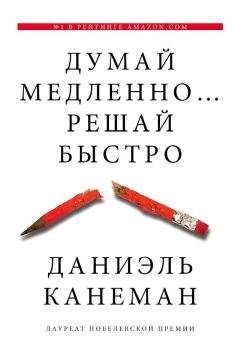с. 60 влияние истощения на формирование суждений…: Shai Danziger, Jonathan Levav, and Liora Avnaim-Pesso, «Extraneous Factors in Judicial Decisions», PNAS 108 (2011): 6889–92.
с. 62 интуитивный – неверный – ответ…: Shane Frederick, «Cognitive Reflection and Decision Making», Journal of Economic Perspectives 19 (2005): 25–42.
с. 62 считают этот силлогизм истинным…: Эта систематическая ошибка известна как «ошибка веры». Evans, «Dual-Processing Accounts of Reasoning, Judgment, and Social Cognition.»
с. 64 назвал бы их более рациональными…: Keith E. Stanovich, Rationality and the Reflective Mind (New York: Oxford University Press, 2011).
с. 65 перед жестокой дилеммой…: Walter Mischel and Ebbe B. Ebbesen, «Attention in Delay of Gratification», Journal of Personality and Social Psychology 16 (1970): 329–37.
с. 65 в комнате не было игрушек…: Inge-M arie Eigsti et al., «Predicting Cognitive Control from Preschool to Late Adolescence and Young Adulthood», Psychological Science 17 (2006): 478–84.
с. 65 больше баллов в тестах на интеллект…: Mischel and Ebbesen, «Attention in Delay of Gratification.» Walter Mischel, «Processes in Delay of Gratification», in Advances in Experimental Social Psychology, Vol. 7, ed. Leonard Berkowitz (San Diego, CA: Academic Press, 1974), 249–92. Walter Mischel, Yuichi Shoda, and Monica L. Rodriguez, «Delay of Gratification in Children», Science 244 (1989): 933–38. Eigsti, «Predicting Cognitive Control from Preschool to Late Adolescence.»
с. 66 улучшение сохранялось…: M. Rosario Rueda et al., «Training, Maturation, and Genetic Influences on the Development of Executive Attention», PNAS 102 (2005): 14931–36.
с. 68 измерение интеллекта обычными способами…: Maggie E. Toplak, Richard F. West, and Keith E. Stanovich, «The Cognitive Reflection Te st as a Predictor of Performance on Heuristics-and-Biases Tasks», Memory amp Cognition (in press).
4. Ассоциативный механизм
с. 69 Ассоциативный механизм…: Carey K. Morewedge and Daniel Kahneman, «Associative Processes in Intuitive Judgment», Trends in Cognitive Sciences 14 (2010): 435–40.
с. 69 без вашего контроля…: Во избежание путаницы я не упомянул в тексте расширение зрачков. Зрачок увеличивается и при эмоциональном возбуждении, и при возбуждении, сопровождающем интеллектуальные усилия.
с. 71 думаем не только мозгом, но и всем телом…: Paula M. Niedenthal, «Embodying Emotion», Science 316 (2007): 1002–1005.
с. 72 «МЫТЬ» дает установку на «МЫЛО»…: Можно представить работающую помпу. После первых нескольких качков вода не появляется, но они нужны, чтобы последующие качки были эффективнее.
с. 73 фразы длиной в четыре слова из наборов по пять слов…: John A. Bargh, Mark Chen, and Lara Burrows, «Automaticity of Social Behavior: Direct Effects of Trait Construct and Stereotype Activation on Action», Journal of Personality and Social Psychology 71 (1996): 230–44.
с. 74 слова, относящиеся к старости…: Thomas Mussweiler, «Doing Is for Thinking! Stereotype Activation by Stereotypic Movements», Psychological Science 17 (2006): 17–21.
с. 75 комиксы Гэри Ларсона…: Fritz Strack, Leonard L. Martin, and Sabine Stepper, «Inhibiting and Facilitating Conditions of the Human Smile: A Nonobtrusive Test of the Facial Feedback Hypothesis», Journal of Personality and Social Psychology 54 (1988): 768–77.
с. 75 эмоциональнее реагировали на фотографии…: Ulf Dimberg, Monika Thunberg, and Sara Grunedal, «Facial Reactions to Emotional Stimuli: Automatically Controlled Emotional Responses», Cognition and Emotion 16 (2002): 449–71.
с. 75 слушать сообщения…: Gary L. Wells and R ichard E. Petty, «The Effects of Overt Head Movements on Persuasion: Compatibility and Incompatibility of Responses», Basic and Applied Social Psychology 1 (1980): 219–30.
с. 76 увеличить финансирование школ…: Jonah Berger, Marc Meredith, and S. Christian Wheeler, «Contextual Priming: Where People Vote Affects How They Vote», PNAS 105 (2008): 8846–49.
с. 76 упоминание о деньгах…: Kathleen D. Vohs, «The Psychological Consequences of Money», Science 314 (2006): 1154–56.
с. 77 привлекательность авторитарных идей…: Jeff Greenberg et al., «Evidence for Terror Management Theory II: The Effect of Mortality Salience on Reactions to Those Who Threaten or Bolster the Cultural Worldview», Journal of Personality and Social Psychology 58 (1990): 308–18.
с. 78 эффектом леди Макбет…: Chen-Bo Zhong and Katie Liljenquist, «Washing Away Your Sins: Threatened Morality and Physical Cleansing», Science 313 (2006): 1451– 52.
с. 78 предпочли мыло ополаскивателю…: Spike Lee and Norbert Schwarz, «Dirty Hands and Dirty Mouths: Embodiment of the Moral-Purity Metaphor Is Specific to the Motor Modality Involved in Moral Transgression», Psychological Science 21 (2010): 1423–25.
с. 79 британского университета…: Melissa Bateson, Daniel Nettle, and Gilbert Roberts, «Cues of Being Watched Enhance Cooperation in a Real-World Setting», Biology Letters 2 (2006): 412–14.
с. 80 кто этот незнакомец внутри вас…: В книге Тимоти Уилсона Strangers to Ourselves (Cambridge, MA: Belknap Press, 2002) вводится понятие «адаптивного бессознательного», представляющего собой Систему 1.
5. Когнитивная легкость
с. 81 начинается с «легко» и заканчивается «с трудом»…: Когнитивную легкость иногда называют «беглость».
с. 82 различных входов и выходов…: Adam L. Alter and Daniel M. Oppenheimer, «Uniting the Tribes of Fluency to Form a Metacognitive Nation», Personality and Social Psychology Review 13 (2009): 219–35.
с. 83 Как стать знаменитым за ночь…: Larry L. Jacoby, Colleen Kelley, Judith Brown, and Jennifer Jasechko, «Becoming Famous Overnight: Limits on the Ability to Avoid Unconscious Influences of the Past», Journal of Personality and Social Psychology 56 (1989): 326–38.
с. 83 хорошо сформулировал проблему…: Bruce W. A. Whittlesea, Larry L. Jacoby, and Krista Girard, «Illusions of Immediate Memory: Evidence of an Attributional Basis for Feelings of Familiarity and Perceptual Quality», Journal of Memory and Language 29 (1990): 716–32.
с. 85 ощущение знакомости…: Обычно, встретив друга, вы немедленно можете его узнать и назвать; часто вы помните, где встречались в прошлый раз, как он был одет и о чем вы говорили. Ощущение знакомости появляется, только если точные воспоминания недоступны. Это запасной вариант. Хотя на него не всегда можно положиться, но лучше что-то, чем ничего. Ощущение знакомости помогает нам не выглядеть нелепо, если нас тепло приветствует человек, который кажется лишь смутно знакомым.
с. 85 температура тела курицы…: Ian Begg, Victoria Armour, and Therese Kerr, «On Believing What We Remember», Canadian Journal of Behavioural Science 17 (1985): 199–214.
с. 86 малой достоверности информации…: Daniel M. Oppenheimer, «Consequences of Erudite Vernacular Utilized Irrespective of Necessity: Problems with Using Long Words Needlessly», Applied Cognitive Psychology 20 (2006): 139–56.
с. 87 рифмованные афоризмы…: Matthew S. Mc Glone and Jessica Tofighbakhsh, «Birds of a Feather Flock Conjointly (?): Rhyme as Reason in Aphorisms», Psychological Science 11 (2000): 424–28.
с. 87 выдуманных турецких компаний…: Anuj K. Shah and Daniel M. Oppenheimer, «Easy Does It: The Role of Fluency in Cue Weighting», Judgm ent and Decision Making Journal 2 (2007): 371–79.
с. 88 с большим вниманием и аналитически…: Adam L. Alter, Daniel M. Oppenheimer, Nicholas Epley, and Rebecca Eyre, «Overcoming Intuition: Metacognitive Difficulty Activates Analytic Reasoning», Journal of Experimental Psychology – General 136 (2007): 569–76.
с. 89 фотографии предметов…: Piotr Winkielman and John T. Cacioppo, «Mind at Ease Puts a Smile on the Face: Psychophysiological Evidence That Processing Facilitation Increases Positive Affect», Journal of Personality and Social Psychology 81 (2001): 989–1000.
с. 90 небольшое преимущество…: Adam L. Alter and Daniel M. Oppenheimer, «Predicting Short-Term Stock Fluctuations by Using Processing Fluency», PNAS 103 (2006). Michael J. Cooper, Orlin Dimitrov, and P. Raghavendra Rau, «A Rose.com by Any Other Name», Journal of Finance 56 (2001): 2371–88.
с. 90 названных неудобно…: Pascal Pensa, «Nomen Est Omen: How Company Names Influence Short and Long-Run Stock Market Performance», Social Science Research Network Working Paper, September 2006.
с. 90 эффектом простого предъявления…: Robert B. Zajonc, «Attitudinal Effects of Mere Exposure», Journal of Personality and Social Psychology 9 (1968): 1–27.
с. 90 любимых экспериментов…: Robert B. Zajonc and D. W. Rajecki, «Exposure and Affect: A Field Experiment», Psychonomic Science 17 (1969): 216–17.
с. 91 видит не осознавая…: Jennifer L. Monahan, Sheila T. Murphy, and Robert B. Zajonc, «Subliminal Mere Exposure: Specific, General, and Diffuse Effects», Psychological Science 11 (2000): 462–66.
с. 91 находясь в скорлупе…: D. W. Rajecki, «Effects of Prenatal Exposure to Auditory or Visual Stimulation on Postnatal Distress Vocalizations in Chicks», Behavioral Biology 11 (1974): 525–36.
с. 92 Последствия многократного взаимодействия……: R obert B. Zajonc, «Mere Exposure: A Gateway to the Subliminal», Current Directions in Psychological Science 10 (2001): 227.
с. 93 тройки слов…: Annette Bolte, Thomas Goschke, and Julius Kuhl, «Emotion and Intuition: Effects of Positive and Negative Mood on Implicit Judgments of Semantic Coherence», Psychological Science 14 (2003): 416–21.
с. 93 ассоциация проявляется…: Анализ исключает все случаи, когда испытуемый нашел правильное решение. Получается, что даже тот, кто в итоге не нашел ассоциацию, примерно догадывался, что она есть.
с. 93 повышающие когнитивную легкость…: Sascha Topolinski and Fritz Strack, «The Architecture of Intuition: Fluency and Affect Determine Intuitive Judgments of Semantic and Visual Coherence and Judgments of Grammaticality in Artificial Grammar Learning», Journal of Experimental Psychology – General 138 (2009): 39–63.
с. 94 точность возрастает более чем вдвое…: Bolte, Gosc hke, and Kuhl, «Emotion and Intuition.»
с. 94 входят в одну группу…: Barbara Fredrickson, Positivity: Groundbreaking Research Reveals How to Embrace the Hidden Strength of Positive Emotions, Overcome Negativity, and Thrive (New York: Random House, 2009). Joseph P. Forgas and Rebekah East, «On Being Happy and Gullible: Mood Effects on Skepticism and the Detection of Deception», Journal of Experimental Social Psychology 44 (2008): 1362–67.
с. 95 Такая реакция…: Sascha Topolinski et al., «The Face of Fluency: Semantic Coherence Automatically Elicits a Specific Pattern of Facial Muscle Reactions», Cognition and Emotion 23 (2009): 260–71.
с. 95 согласно проведенным исследованиям, музыка в наушниках……: Sascha Topolinski and Fritz Strack, «The Analysis of Intuition: Processing Fluency and Affect in Judgments of Semantic Coherence», Cognition and Emotion 23 (2009): 1465–1503.
6. Нормы, неожиданности и причины
с. 99 посетитель замечает…: Daniel Kahneman and Dale T. Miller, «Norm Theory: Comparing Reality to Its Alternatives», Psychological Review 93 (1986): 136–53.
с. 101 спина покрыта татуировкой…: Jos J. A. Van Berkum, «Understanding Sentences in Context: What Brain Waves Can Tell Us», Current Directions in Psychological Science 17 (2008): 376–80.
с. 103 слово «карманник» сильнее ассоциируется…: Ran R. Hassin, John A. Bargh, and James S. Uleman, «Spontaneous Causal Inferences», Journal of Experimental Social Psychology 38 (2002): 515–22.
с. 104 выражая удивление, когда последовательность меняется…: Albert Michotte, The Perception of Causality (Andover, MA: Methuen, 1963). Alan M. Leslie and Stephanie Keeble, «Do Six-Month-Old Infants Perceive Causality?» Cognition 25 (1987): 265–88.
с. 104 бурный финал…: Fritz Heider and Mary-Ann Simmel, «An Experimental Study of Apparent Behavior», American Journal of Psychology 13 (1944): 243–59.
с. 105 различают жертв и*censored*ганов…: Leslie and Keeble, «Do Six-Month-Old Infants Perceive Causality?»
с. 105 две центральные идеи многих религий…: Paul Bloom, «Is God an Accident?» Atlantic, December 2005.
7. Механизм для поспешных выводов
с. 109 изящный эксперимент…: Daniel T. Gilbert, Douglas S. Krull, and Patric k S. Malone, «Unbelieving the Unbelievable: Some Problems in the Rejection of False Information», Journal of Personality and Social Psychology 59 (1990): 601–13.
с. 111 описания двух человек…: Solomon E. Asch, «Forming Impressions of Personality», Journal of Abnormal and Social Psychology 41 (1946): 258–90.
с. 112 все шесть прилагательных…: Ibid.
с. 114 «Мудрость толпы»…: James Surowiecki, The Wisdom of Crowds (New York: Anchor Books, 2005) (Рус. изд.: Шуровьески Д. Мудрость толпы: Почему вместе мы умнее, чем поодиночке, и как коллективный разум влияет на бизнес, экономику, общество и государство. – М.: ИД Вильямс, 2007).





